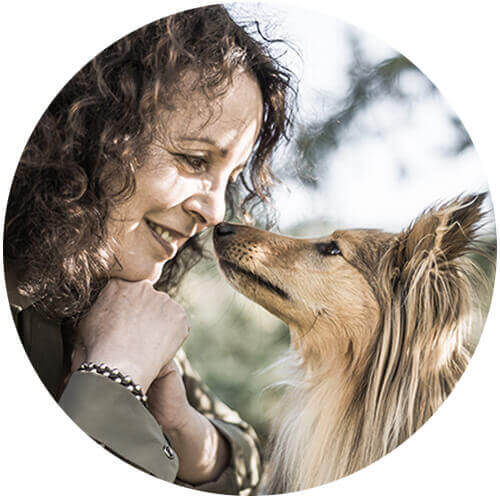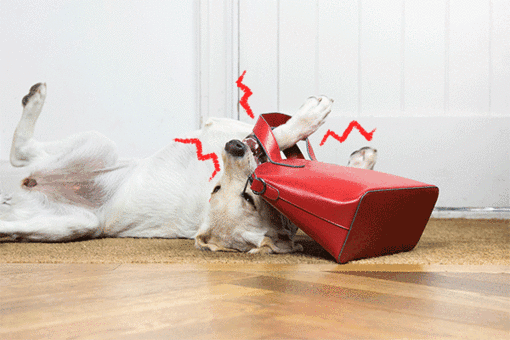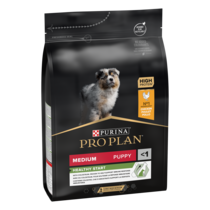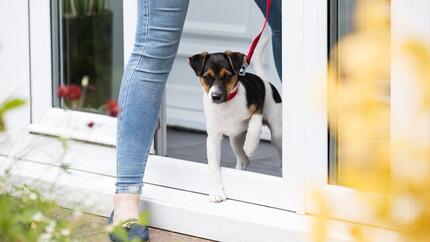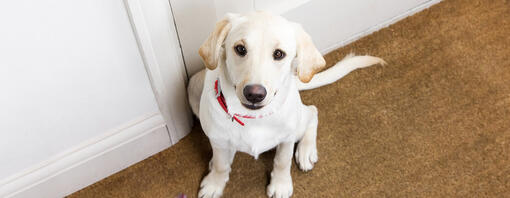

Dogs are social and crave company by nature – that’s why they bond so well with us. However, if they’re not taught how to deal with being alone, this can lead to separation-related problems, commonly known as separation anxiety. Keep reading to discover the common symptoms of puppy separation anxiety, and find out how you can help them overcome it with our useful guide.
Why do puppies get separation anxiety?
It’s easy to think your dog’s being naughty or is annoyed at you for leaving them, however this couldn’t be further from the truth. Puppy separation anxiety arises when they haven’t been taught the coping strategies they need to deal with time alone, and is simply fear of being alone – and can be viewed as similar to a human panic attack.
It’s incredibly difficult to deal with a dog or puppy that can’t be left alone, in fact, it’s probably one of the hardest behavioural problems to overcome. Like many behaviour-related problems however, prevention is far better than a cure.
In the vast majority of cases, puppy anxiety starts at the very beginning. Owners can become so besotted by their new puppy that they’re delighted when they want to follow them everywhere – and this bonding is vitally important. But, if you allow them to constantly be with you, every second of the day, this is what they’re going to grow up to expect. Then suddenly when you need to go out without them, you discover that their world crumbles without you.
In other cases, a new owner may shut their puppy in the kitchen to spend their very first night alone, and this enforces the fact that when they’re left, it’s distressing and scary.
Puppy separation anxiety symptoms
Symptoms of puppy separation anxiety vary from the mild to the extreme and may include the following:
- Excessive barking and/or howling when left.
- Chewing and other destructive behaviours.
- Loss of toilet training.
- Scratching or digging at doors.
- Pacing.
- Excessive panting and salivation.
- Attempts to escape.
- Self-mutilation.
- Aggressive behaviours.
How to get it right from the start
From the minute you bring your puppy home, they need to learn that they can trust you to be there for them, but there are times when they can’t always be with you – and that’s fine. Set up baby gates, and make a habit of going off into a different room and leaving them on their own for a few minutes with something enjoyable to occupy them like their dinner or a treat.
Just quietly walk away, and return with no fuss at all. Make your coming and going a part of life from the very start and give them the confidence to be able to deal with that. Have a shower without them, go for a walk around the garden – anything to teach them right from the beginning that not being with you every minute is not a crisis, and if you give them something tasty to occupy them with, it can even be seen as something to look forward to.
Then you can slowly start to go out without your puppy for five minutes, then 10 minutes, then 30 minutes - until they’re happy to stay on their own for an hour, but always make sure that you take it very slowly.
Leave them in a totally safe area where they feel comfortable with something to take their mind off your absence. Use stuffed Kong’s filled with their favourite yummy snacks or peanut butter to keep them occupied.
Use technology to help you know exactly what’s going on when you leave, so you genuinely know your puppy is happy and not distressed. Set up a webcam with an app so you can watch your puppy on your smartphone while you’re away.
Time spent teaching your puppy that being on their own is safe and part of being a family dog will pay off in the future – but remember that dogs need company and social contact, and no dog is happy being regularly left alone for hours on end.
Helping puppies with separation anxiety
If you already have a puppy with separation anxiety, there are a few things you can try to help them overcome the problem.
Rule out any other problems
First things first, make sure your puppy’s not acting out due to another problem. They could be bored, or they may not be getting enough social company or physical or mental exercise, which may make them act out.
These symptoms are often lumped in with puppy separation anxiety, but actually they are fairly easily solved with more exercise. Try puppy brain games like interactive toys and consider stimulating their mind through training. Alternatively, you can try leaving the radio on or putting them in one room where they’re comfortable and happy, preferably one where there is no outside stimuli which may cause them to bark.
Once again, watching your puppy on a webcam will help you decide whether it’s boredom – in which cases the behaviours will be done fairly calmly and often intermittently, with sleep in between. Or, if it’s separation anxiety, it’s more likely to be constant, and your puppy with display obvious signs of stress.
It’s important to note that sometimes puppies may start off as bored, but may work themselves up and become stressed and anxious. If you’re unsure, find a professional behaviourist experienced in puppy anxiety and have them come and assess your pup.
Tips for mild cases of puppy separation anxiety:
- Start right back at the beginning and teach them how to deal with time apart from you before leaving them again. During this time, they should not be left alone, so you may need to get a pet sitter or a friend to help you.
- When you do start to leave them again, build this up very slowly – and use a webcam so you know your dog is relaxed.
- Leave them with a safe, interactive toy (such as a stuffed Kong) and with the radio or TV on.
- Make sure your dog is tired when you leave them – that way they are more likely to sleep than if they were full of energy – so make sure they’ve had a good walk or game first.
- Don’t make a big fuss about leaving or coming back, this just makes your going even more of an ‘event’ for your dog.
- Try and vary your leaving routine so your dog doesn’t get wound up expecting your imminent departure.
- If your puppy has a more serious separation-related problem, you should ask your vet, or contact an accredited behaviourist to help you work out a programme to try and overcome it.
Puppy separation anxiety is better prevented than cured. However, it’s important to recognise that dogs are social animals, and if they’re going to be frequently left alone for long periods of time, it may not be a good idea to get a dog.
For more puppy advice and guides, take a look at our content hub, full of useful information on how to raise a healthy and happy dog.
